"stiffed" in manila

|
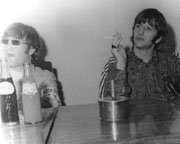 After the trials and tribulations of Japan the Beatles headed for a two shows in the Philippine capital Manila. On July 3, 1966, The Beatles landed on Philippine soil for the first and last time. This two-night stopover in Manila proved disastrous from arrival to departure. Upon landing, The Beatles were immediately whisked to a pier and put on Marina, a yacht owned by Don Manolo Elizalde, two miles from the port. This arrangement completely cut The Beatles from their associates for at least two hours— the first time it ever happened.
After the trials and tribulations of Japan the Beatles headed for a two shows in the Philippine capital Manila. On July 3, 1966, The Beatles landed on Philippine soil for the first and last time. This two-night stopover in Manila proved disastrous from arrival to departure. Upon landing, The Beatles were immediately whisked to a pier and put on Marina, a yacht owned by Don Manolo Elizalde, two miles from the port. This arrangement completely cut The Beatles from their associates for at least two hours— the first time it ever happened.
On July 4, The Beatles held two soldout concerts at the Rizal Memorial Football Stadium with a combined attendance of 80,000; the evening concert registered 50,000 paying audience, being rivaled only in size by the concert The Beatles gave at Shea Stadium in New York on August 15, 1965. Such record-making statistic though was supplanted by the succeeding events owing to a fiasco that happened earlier in the day.
The Beatles' alleged snub of then-First Lady Imelda Marcos occurred on July 4, where a lunch was scheduled at Malacañang Palace at 11 a.m. with 300 children waiting to see The Beatles. An hour before the party, a delegation came to the Manila Hotel to collect The Beatles. Brian Epstein, The Beatles' manager, declined the invitation on the grounds that no earlier arrangement had been made and The Beatles were still in bed.
The day's scheduled concerts, however, later proceeded successfully. In between concerts, local televisions reported the alleged "snub" showing footages of children, some crying, disappointed by The Beatles. Epstein watched in horror and went immediately to the television studio to apologize and set the facts straight. But barely had he started reading his press statement when the transmission blipped.
Newspapers carried the headline, "Beatles Snub President." The following morning was the scheduled departure of The Beatles to New Delhi. Suddenly, The Beatles and their entourage realized they were practically on their own without any help: Room and transportation services were withdrawn. In the airport, the whole Beatles entourage was manhandled as it made its way to the plane.
Tony Barrow, the tour's publicity man and part of the entourage, claimed that Epstein received the invitation the night before the concerts but remained noncommittal. Whether it was wise for the local promoter to take this silence as approval is now moot.
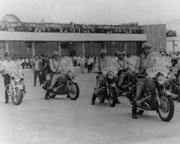 Bill Harry, in his book The Ultimate Beatles Encyclopedia, acknowledges the existence of an invitation from Ramon Ramos, the local promoter, for The Beatles to pay a courtesy call on the First Lady, but it was slated for 3 p.m. of July 4, an hour before The Beatles' scheduled afternoon concert. Ramos did not pursue this invitation, since The Beatles wanted to be in the concert location two hours before the set. Nor did he inform anyone in Malacañang about this. A further mixup in schedule emerged when the Palace set the meeting at 11 a.m. as reported in The Manila Times on July 3. Whether anyone went out of his way to settle the matter, and what transpired in this effort, if any, remains unknown.
Bill Harry, in his book The Ultimate Beatles Encyclopedia, acknowledges the existence of an invitation from Ramon Ramos, the local promoter, for The Beatles to pay a courtesy call on the First Lady, but it was slated for 3 p.m. of July 4, an hour before The Beatles' scheduled afternoon concert. Ramos did not pursue this invitation, since The Beatles wanted to be in the concert location two hours before the set. Nor did he inform anyone in Malacañang about this. A further mixup in schedule emerged when the Palace set the meeting at 11 a.m. as reported in The Manila Times on July 3. Whether anyone went out of his way to settle the matter, and what transpired in this effort, if any, remains unknown.
Peter Brown, the executive director of NEMS Enterprises (The Beatles' Vic Lewis, the tour agent, received the invitation while still in Tokyo but failed to relay this to him.
Much to the Beatles surprise, the palatial tyrants were extremely angered at the Beatles neglect and the morning after the concert, The Manila Times ran the headline "Imelda Stood Up!!". The ramifications were to become serious. Philippine promoter Ramon Ramos refused to pay the Beatles for their performance! Bomb and death threats were telephoned to the deluged British Embassy and to the boys hotel suite. Brian Epstein was so distressed with the situation he arranged for a press conference from the hotel to apologize for the misunderstanding. BUT...as fate would have it, some unforeseen static blipped out his interview from most all TV screens in the country! (more than a few thought it was probably more shenanigans by the Marcos clan).
Pulling more strings the next day when the Beatles were scheduled to depart the country, Misael Vera, Philippine Tax Authority, insisted the group could not leave the country until every penny of the taxes owed them was paid! Of course, they never got paid anything but Brian hurriedly forked over a bond out his own funds for P.74,450 (around $18,000) to settle the matter.
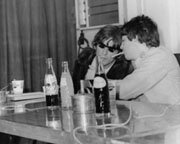 To make matters worse, all security detail assigned to the boys were withdrawn leaving them extremely vulnerable. They were literally kicked and jostled as they left their hotel and totally harassed all the way to the airport. Things were no better there where the airport manager has also removed all security for the Beatles. They went so far as to shut down the power to stop the escalators, forcing the boys to scale several flights of stairs with their own luggage, only to face an angry mob of 200 Filipinos brutally manhandling them! Ringo was literally floored by an uppercut and kicked on the ground. He suffered a sprained ankle as well and had to be helped to the customs area. Mal Evans and Brian Epstein were injured as well. Alf Bicknell suffered a cracked rib and a spinal injury.
To make matters worse, all security detail assigned to the boys were withdrawn leaving them extremely vulnerable. They were literally kicked and jostled as they left their hotel and totally harassed all the way to the airport. Things were no better there where the airport manager has also removed all security for the Beatles. They went so far as to shut down the power to stop the escalators, forcing the boys to scale several flights of stairs with their own luggage, only to face an angry mob of 200 Filipinos brutally manhandling them! Ringo was literally floored by an uppercut and kicked on the ground. He suffered a sprained ankle as well and had to be helped to the customs area. Mal Evans and Brian Epstein were injured as well. Alf Bicknell suffered a cracked rib and a spinal injury.
When they finally approached the plane, a large booing crowd jeered and mocked them chanting "Beatles Alis Dayan!" (Go Home Beatles!) Once in the plane, some scraping government officials "decided" the Beatles were NOT authorized to leave the country due to inaccurate "check in" procedures days earlier... This led to another 40 minute wait on the Tarmac while Mal & Tony Barrow went back to the terminal to clean up the necessary paperwork. Only minutes after the Beatles angrily departed, did the press run a statement by President Marcos stating "Their was no intention on the part of the Beatles to slight the first lady or the government of the Republic Of The Philippines". Obviously a bit too late to do the Beatles any good.
IN THEIR OWN WORDS: excerpt from "The Beatles Anthology"...
Ringo: I hated the Philippines. We arrived there with thousands upon thousands of kids, with hundreds upon hundred of policemen, and it was a little dodgy. Everyone had guns and it was really like that hot/Catholic/gun/Spanish Inquisition attitude.
George: There were tough gorillas, little men who had short-sleeved shirts and acted very menacingly.
The normal proceedings in those days was that because the mania was everywhere, we didn't pull up at an airport and get off the plane like normal people. The plane would land and it would go to the far end of the airfield where we would get off, usually with Neil and our diplomatic bags (we carried our shaving gear and whatever in little bags), get in a car, bypass passport control and go to the gig. Mal Evans with Brian Epstein and the rest would go and do our passports and all that scene.
But when we got to Manila, a fellow was screaming at us, "Leave those bags there! Get in the car!" We were being bullied for the first time. It wasn't respectful. Everywhere else - Amercia, Sweden, Germany, wherever - even though there was a mania, there was always a lot of respect because we were famous showbiz personalities. But in Manila it was a very negative vibe from the moment we got off the plane, so we were a bit frightened.
We got in the car and the guy drove off with us four, leaving Neil behind. Our bags were on the runway and I was thinking: "This is it, we're going to get busted."
(Neil Aspinall: The army was there and also some thugs in short-sleeved shirts over their trousers and they all had guns. You could see the bulges. These guys got the four Beatles and stuck them in a limo and drove off and wouldn't let them take their briefcases with them. They left them on the runway and those little briefcases had the marijuana in them.
So while the confusion was going on I put them in the boot of the limo that I was going in and said: "Take me to wherever you've taken the Beatles.")
George: They took us away and drove us down to Manila harbour, put us on a boat, took us out to a motor yacht and put us in this room.
It was really humid, Mosquito City, and we were all sweating and frightened. For the first time ever in our Beatle existence, we were cut off from Neil, Mal and Brian Epstein. There was not one of them around and, not only that, but we had a whole row of cops with guns lining the deck around this cabin that we were in. We were really gloomy, very brought down by the whole thing. We wished we hadn't come. We should have missed it out.
Ringo: The Philippines was really frightening. It's probably the most frightening thing that has happened to me.
George: As soon as we got there it was bad news.
(Neil Aspinall: They drove me to the end of a pier and I got out of the car and said, "Where are they?" They pointed: "There they are," and there was a big boat miles away in the middle of the habour. There were what seemed to be rival militia gangs. One gang had taken them and put them on this boat to meet some people who weren't the people putting on the show. It was all very strange. I never really understood why they got put on a boat.)
George: We've no idea why they took us to the boat. I still don't know to this day. An hour or two later Brian Epstein arrived, really flustered, with the Philippine promoter, and he was yelling and shouting. Everyone was shouting and then they took us off the boat, put us in a car and drove us to a hotel suite.
The next morning we were woken up by bangs on the door of the hotel and there was a lot of panic going on outside. Somebody came into the room and said: "Come on! You're supposed to be at the palace." We said: "What are you talking about? We're not going to any palace." "You're supposed to be at the palace. Turn on the television."
We did, and there it was, live from the palace. There was a huge line of people either side of the long marble corridor with kids in their best clothing and the TV commentator saying: "And they're still not here yet. The Beatles are supposed to be here."
We sat there in amazement. We couldn't believe it. We just had to watch ourselves not arriving at the presidential palace.
Paul: I went out on my own in the morning to the kind of Wall Street area (Makati, the financial district -Ed.). I remember taking a lot of photographs because right up against it was the shanty town area. There were cardboard dwellings right up against this Wall Street which I'd never seen so well juxtaposed. I got the camera out: "Wow, this is good stuff!" And I bought a couple of paintings from the shanty town as presents to go back home and went back to the hotel to have lunch.
Everyone was up and about then and we were in our hotel room when they started saying: "You've got to go to the President's Palace now. Remember that engagement?" We said: "No, no, no." The promotors, with those white shirts with lace (called a "Barong Tagalog" -Ed..) that everyone in Manila seemed to wear, looked a little heavy to us. A couple of them carried guns, so it was a bit difficult.
We were used to each different country doing it their own way. They were starting to bang on the door: "They will come! They must come!" But we were saying, "Look, just lock the bloody door." We were used to it: "It's our day off."
We found out later that it was Imelda Marcos (with her shoes and her bras) waiting for us. Somebody had invited us and we (gracefully, we thought) had declined the offer. But there was the TV announcer saying, "the first Lady is waiting and pretty soon the famous pop group will be arriving". And we're going, "Shoot - nobody's told them!" We stuck to our guns and sat the rest of the day out in the hotel. We turned the telly off and got on with our day off.
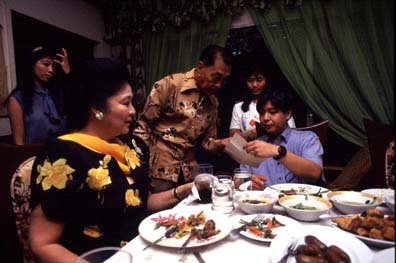
Imelda Marcos, having lunch in 1996 (minus the Beatles!)
Ringo: Personally, I didn't know anything about Madame Marcos having invited us to dinner. But we'd said no and Brian Epstein had told her no. John and I were sharing a room and we woke up in the morning and phoned down for eggs and bacon (or whatever we were eating in those days) and all the newspapers because we always liked to read about ourselves.
We were just hanging out in our beds, chatting and doing whatever we were doing and time went by so we called down again: "Excuse me, can we have the breakfast?" Still nothing happened, so we put the TV on and there was a horrific TV show of Madame Marcos screaming: "They've let me down." There were all these shots with the cameraman focusing on empty plates and up into the little kids' faces, all crying because the Beatles hadn't turned up.
(Neil Aspinall: The Beatles didn't do that sort of stuff for anybody. They wouldn't get involved in politics and they wouldn't go to the palace.
After it was all over and they hadn't turned up and people were going barmy, we asked Brian what had happened and he said: "I cancelled it. You weren't supposed to go there."
It turned nasty in the Philippines. I didn't eat for three days. They would bring up food that was terrible. Even if it was Cornflakes for breakfast, you'd pour the milk out and it would come out in lumps. They had given you sour milk. I remember once ordering dinner and it came up on of those big trays with the rolled lid on it. I rolled back the lid and Ohhhhh! Just by the smell of it I knew we couldn't eat it.
Paul and I sneaked out there as well. We must have been very brave or very naive. We got in a car and drove for miles. It was like Manhattan for five minutes and then a dreadful shanty town for a long way out to some sand dunes. We bought a couple of pictures, sat in the sand dunes and had a smoke, then drove back to the hotel with everybody freaking out (especially the security): "Where have you been? How did you get out?"
Although people kept saying it was a failure in the Philippines, the Beatles did two gigs to a total of about 100,000 people (after the Marcos thing). The fans had a really good time. They really enjoyed it. There were still thugs about, organising things (nothing to do with the army), but they seemed to be organising the fans rather than us.)
George: Again, we had a big problem with the concert. Brain Epstein had made a contract for a stadium of so many thousand people, but when we got there it was like the Monterey Pop Festival. There were about 200,000 people on the site and we were thinking: "Well, the promoter is probably making a bit on the side out of this." We went back to the hotel really tired and jet lagged and pretty cheesed off. I don't recall much of what happened after that until the newspapers arrived.
Paul: The next morning someone brought in a newspaper and on the front it just said in massive letters: "Beatles Snub President". Oh dear! Well, we didn't mean to. We thought, "We'll just say we're sorry."
We were scheduled to leave Manila that morning and as we were leaving the hotel everyone was a bit nasty at reception, so we had to scuffle out as if we hadn't paid our bill.
Ringo: Things started to get really weird: "Come on! Get out of bed! Get packed, we're getting out of here." And as we got downstairs and started to get to the car - we really had no help - there was only one motorbike compared to the huge motorcade that had brought us in.
George: It was "Beatles Snub First Family" - that's how they decided to present it. It was quite likely it was the promoter or the agent who had done a deal; brown-nosing Mrs Marcos, probably. She was later quoted as saying: "Oh, I never liked them anyway - their music is horrible!"
The whole place turned on us. We had people yelling and screaming when we tried to get to the airport. Nobody would give us a ride. We couldn't get any cars. There was nothing available.
Finally somebody managed to get a car or two and they put our baggage in one and we got in the other. We were driven to the airport. Two things were happening simultaneously: there were all the government officials or police, who were trying to punch us and yelling and waving fists at us, and then underneath that were the young kids who were still around doing the mania.
(Neil Apsinall: They were really putting obstacles in our way. When we were on the way to the airport, a soldier kept sending us round and round the roundabout until in the end I told the driver to pull over.)
Paul: We got down to the airport and found they'd turned the escalators off. So we had to walk up the escalators. All right, let's get out of here then if that's what it's going to be.
Behind a huge plate glass window, the sort they have in airports, on the taxi rank outside there were all the Filipino taxi guys banging on the window and we're all going gibber, gibber.
(Neil Aspinall: Nobody would help us with all this equipment and so we started using the escalators and then they stopped. So we had to lug all the stuff up the stairs and once we got it all up the stairs the escalators started to work again. The Beatles were going to Delhi and the equipment was going back to England. So at the check-in desk we kept saying, "OK, that's going to Delhi", and they kept putting it on the pile that was going to England. In the end Mal jumped over the counter and sorted it all out for us because nobody was going to do it.)
George: It seemed like forever at the check-in desk. We eventaully got into the departure lounge, which was a huge room, but then the thugs appeared again - the same people with the short-sleeved shirts who had been shouting at us as soon as we had got off the plane when we arrived in Manila.
There were a number of them coming up to us, pushing and screaming, "Get over there!" They forced us back and then another one would come around the other way, doing it again: "Get over there!" I was trying to keep my eye on all the people, keep moving ahead of them to stay out of their way. It was all really negative. I saw a couple of Buddhist monks and went and hid behind them.
Ringo: There was chanting, with people hating us all the way. They started spitting at us, spitting on us, and there's the famous story of John and me hiding behind these nuns because we thought, "It's a Catholic country, they won't beat up the nuns."
Paul: There was a group of nuns in the corner of the airport and when all the fisticuffs broke out we went over to the nuns. It was rather a nice little shot, nuns and Beatles in the corner. They didn't actually protect us, they just stood there looking a bit bemused. Whenever they moved, we moved the other side of them.
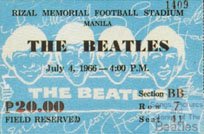
Manila 1966 concert ticket stub
John: When they started on us at the airport, I was petrified. I thought I was going to get hit, so I headed for three nuns and two monks, thinking that might stop them. As far as I know I was just pushed, but I could have been kicked and not known it.
"You treat like ordinary passenger, ordinary passenger," they were saying. We said: "Ordinary passenger? He doesn't get kicked, does he?"
I saw five in sort of outfits who were doing it, all the kicking and booing and shouting.
That was Brian's cock-up. Because he'd had the invitation given to him and declined it and never told us. It was terrifying.
Paul: We were quite frightened. Most of the aggression (luckily for us) was directed towards our people. One of them got thrown down the stairs violently. But mostly it wasn't overt, though they were annoyed.
We felt a bit guilty, but we didn't feel it was our cock-up. Now, knowing more about the regime, what I think is that they had ignored our telling them we weren't coming: "Let them just try and not come - we'll make it difficult for them."
(Neil Aspinall: I'm sure nobody got badly hurt, but that was because we didn't fight back, so we got pushed and shoved. We knew not to fight back.
If we had fought back it could have been very bad. It was very, very scary and nothing like this had ever happened before - and nothing like it has ever happened since.)
George: Finally they announced the flight and we boarded the plane - and that was the greatest feeling, just to be on that plane. It was a sense of relief. Then the plane sat there.
Eventually, there was an announcement on the speaker saying, "Will Mr Epstein and Mr Evans and Mr Barrow (Tony, who was our press agent at that time) get off the plane?" They all had to get off and they looked terrified.
Mal went past me down the aisle of the plane breaking out in tears and he turned to me and said: "Tell Lil I love her." (Lil was his wife.) He thought that was it: the plane was going to go and he would be stuck in Manila.
The whole feeling was, "Hell, what's going to happen?"
Paul: When we got on the plane, we were all kissing the seats. It was feeling as if we'd found sanctuary. We had definitely been in a foreign country where all the rules had changed and they carried guns. So we weren't too gung-ho about it at all.
Tony Barrow had to go back into the lion's den and they made him pay an amazing airport leaving Manila tax that I think they just dreamed up. Strangely enough, I think it came to the same amount as the receipts for the trip.
George: We sat there for what seemed like a couple of hours. It was probably only 30 minutes or an hour, but it was humid and hot. Finally they reboarded, the front door closed and the plane was allowed to leave. I felt such resentment against those people.
Paul: I remember when we got back home a journalist asked George: "Did you enjoy it?" And he said: "If I had an atomic bomb I'd go over there and drop it on them."
It was an unfortunate little trip, but the nice thing about it was that in the end, when we found out what Marcos and Imelda had been doing to the people - the rip-off that the whole thing was - we were glad to have done what we did. Great! We must have been the only people who'd ever dared to snub Marcos. But we didn't really know what we were doing politically until many years later.
Ringo: We had fantasies that we were going to be put in jail because it was a dictatorship there in those days, not a democracy. You lose your rights in a dictatorship, no matter who you are. So we weren't going to get off the plane. That was my first and last time in Manila. (NOTE: The Philippines were under martial law at that time, by order of President Ferdinand Marcos..)
(Neil Aspinall: I'm sure it made the band think hard about touring. It might have been one of the last nails in the touring coffin.)
(George Martin: When they got out of the country they said, "Never again. This is it." They said to Brian then that they would not tour again. Brian said, "Sorry, lads, we have got something fixed up for Shea Stadium. If we cancel it you are going to lose a million dollars."
Oops. They did do Shea Stadium.)
John: No plane's going to go through the Philippines with me on it. I wouldn't even fly over it.